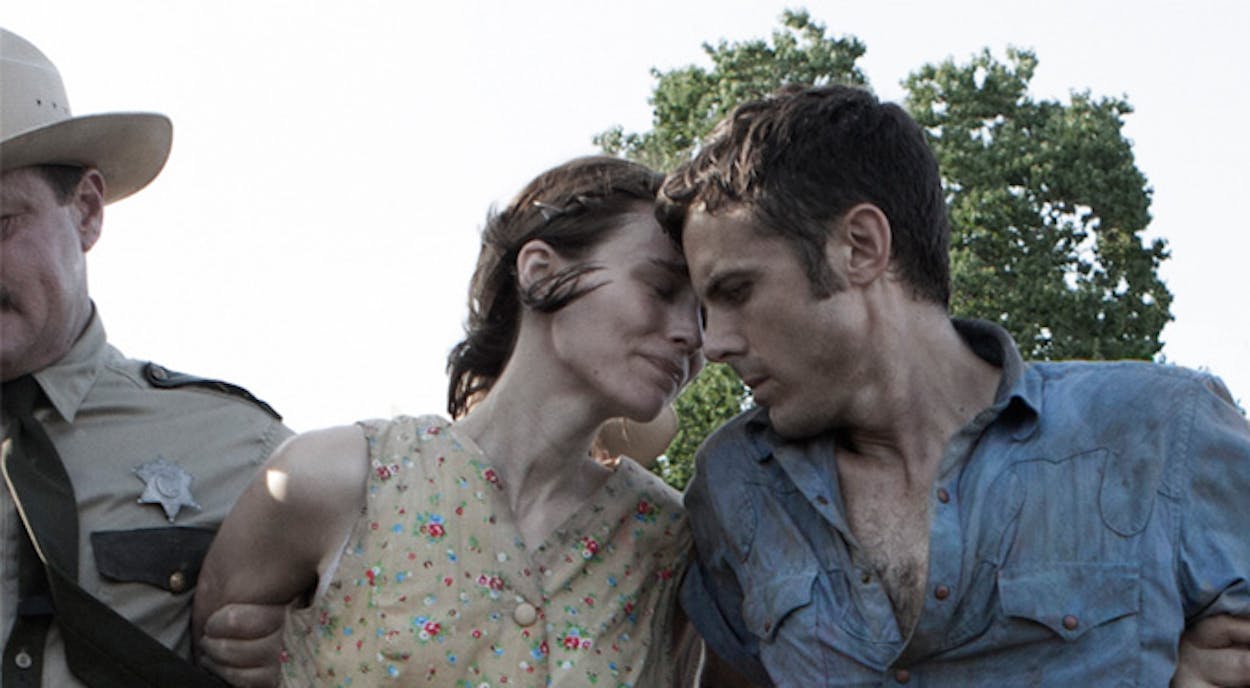By most standards, the new film Ain’t Them Bodies Saints should be a source of pride for Texas’ growing film industry. This thriller, which stars Rooney Mara, Casey Affleck, and Ben Foster, is set in Central Texas. It was written and directed by the Dallas-based David Lowery. And its producers include Toby Halbrooks, also of Dallas, and James M. Johnston, of Fort Worth. Acquired by IFC Films at this year’s Sundance Film Festival, the movie opened in limited release earlier this month, to mostly favorable reviews and is expected to expand to more than one hundred theaters nationwide, making it one of the highest-profile Texas titles of the year.
Yet one detail nags.
With the exception of a few sequences that were shot in Meridian, Austin, and Dallas, Ain’t Them Bodies Saints was filmed mostly in Shreveport, Louisiana. That state’s generous film-production incentive program rewarded Ain’t Them Bodies Saints nearly $1 million in tax credits—in effect, allowing Lowery to make a $4 million film for $3 million. Texas’ film-incentive program, the producers said, offered a fraction of that.
“For us, the artistic choice was to shoot in Texas,” said Johnston. “But looking at the numbers, there wasn’t a choice.”
Situations like these have long frustrated Texas entertainment-industry professionals, though things may be changing. Earlier this year, the Texas Legislature approved a spending bill that would give $95 million to the state’s production-incentive program in the 2014-15 budget, nearly tripling the $32 million that was in the 2012-13 budget.
Heather Page, director of the Texas Film Commission, said that the success of such recent filmed-in-Texas efforts as Ethan and Joel Coen’s True Grit and TNT’s reboot of Dallas had helped make the case for increasing the program’s budget.
“We have been able to collect and show real economic data to leadership and legislators that shows how communities across this state experience clear and meaningful economic benefits from film, television and commercial productions,” Page said in an email.
The program, however, may still not be able to help Texas compete with states like Louisiana, Georgia, and New York.
The calculus of determining incentives is complicated. Generally, low-budget movies can get refunds of ten to seventeen percent of what they spend on production and salaries in Texas. (Big-budget movies get a more generous rate.) The additional financing approved for 2014 will not change that rate but will expand the number of projects that can be rewarded.
This is far less than the thirty percent to 35 percent offered by Louisiana and New York. “Texas has a very fair and generous incentive program, but it just can’t compete,” Johnston said. “In Louisiana, if you spend the money, there are a few hoops you have to jump through, but you get thirty percent back.”
For higher-profile efforts, like Dallas or the NBC series Revolution, which has been shooting its second season in Austin, municipally financed film commissions like the Dallas Film Commission will often step in to sweeten the pot. But for independent projects, like Ain’t Them Bodies Saints, local incentive deals can be harder to come by or complicated to patch together.
One additional complication is a 2007 clause that allows the Film Commission to reject a project if it includes “inappropriate content or content that portrays Texas or Texans in a negative fashion.” Exactly how such determinations are made—and according to what standards—is unclear.
In July, Machete’s Chop Shop, a production company that backed Robert Rodriguez’s 2010 film Machete, sued the Texas Film Commission and its director, claiming that the commission had used the clause to renege on more than $2 million in promised incentives.
According to the lawsuit, in 2009 the commission approved the script of Machete, a freewheeling action movie that satirizes anti-immigration attitudes in Texas. But once the film opened, according to the suit, the commission denied the funds. It was the first time the clause, which is rarely invoked, had been exercised after a film had finished shooting.
“We filed the lawsuit so that we can have judicial guidance on how the process is supposed to work,” said Bob Tyler, the Austin-based lawyer for Machete’s Chop Shop. “The Texas Film Commission, filmmakers and investors all need predictability when making a decision to invest in Texas.” (Rodriguez, whose sequel Machete Kills opens October 11 and was filmed in Austin, issued a statement in July saying that he was not involved in the lawsuit.)
The Texas Film Commission, which is part of Governor Rick Perry’s office, declined to comment on the lawsuit or about broader questions about whether the clause might squelch artistic expression. Filmmakers were also reluctant to go on the record, out of concern that their projects might suffer negative repercussions. But one New York-based producer, who requested anonymity, echoed a common concern about the possibility that incentive funds might be based on the film commission’s ideological or political judgments.
“Am I taking a chance by shooting there?” he asked, referring to Texas. “The truth is, you are.”






